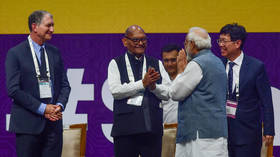Modi rolls out red carpet for semiconductor investors

India has scaled up incentives for semiconductor manufacturers, under a $10 billion program aiming to position the country as a global hub for chip-making, challenging China’s dominance, the Indian prime minister has said.
Addressing the Semicon India 2023 conference in Gujarat on Friday, attended by heads of US chipmaker Advanced Micro Devices and Taiwanese giant Foxconn, Prime Minister Narendra Modi said India’s semiconductor space is poised to witness exponential growth.
Modi noted that every industrial revolution has been driven by people’s aspirations, and the fourth such revolution is being driven by India's goals. "A year ago, people used to ask why they should invest in the Indian semiconductor sector. Now they ask why not invest in India," he added.
Outlining his country’ support for the semiconductor industry, the prime minister noted that state subsidies for companies willing to set up chip-manufacturing facilities in India have been increased from 30% to 50% of the set-up cost. The scheme was approved last year amid concerns by investors whose applications to build facilities domestically had faced various roadblocks.
Examples include a $3 billion semiconductor project by the ISMC consortium, a joint venture between the Abu Dhabi-based Next Orbit Ventures and Israel's Tower Semiconductor, and Foxconn’s $19.5 billion joint venture with India’s mines-to-metals conglomerate Vedanta. Foxconn withdrew from the project earlier this month, but said it would continue exploring opportunities in the Indian market.
At the Semicon conference on Friday, Foxconn Chairman Young Liu said he was optimistic over India's semiconductor plan. “Taiwan is and will be your most trusted and reliable partner...Let's do this together,” Liu said. He later told news network CNBC-TV18 that the world's largest electronics manufacturer would also invest $2 billion over the next five years, without providing further details.
“PM @narendramodi ji once mentioned that ‘IT’ stands for India and Taiwan. Taiwan is and will be your most trusted and reliable partner. Let’s do this together.” - Young Liu, CEO Foxconn.@GoI_MeitY@SemiconIndia@Semicon_India@_DigitalIndia@Electronics_GoI#SemiconIndia2023… pic.twitter.com/ChQ67AKjf8
— Rajeev Chandrasekhar 🇮🇳 (@Rajeev_GoI) July 28, 2023
US chipmaker Advanced Micro Device has announced plans to invest around $400 million in India over the next five years, and build its largest design center in the tech hub of Bengaluru. Another American company, Micron, has announced plans to invest over $2.7 billion in an assembly and test plant in Gujarat. Vedanta chairman Anil Agarwal told Mind that the conglomerate had set up its own semiconductor facility, with investment of $5 billion in the first phase.
India’s ambitious plan to become a global chip-making hub for the world, given that major players have been looking for ways to diversify from China, includes not just financial stimulus but creating an entire ecosystem with a qualified workforce.
“For the semiconductor ecosystem, we are changing the engineering curriculum. India has identified more than 300 big colleges where courses will be offered on semiconductors,” Modi said, adding that in the next five years the country will have more than 100,000 design engineers. He also took note of a growing startup ecosystem in the chip-making space.
Modi also highlighted efforts to revamp infrastructure, allowing “exponential growth” of the chip-making industry. He said the country's installed solar power capacity has multiplied by 20 times in the last decade and that a new target of 500 GW of renewable energy capacity has been set for 2030.













